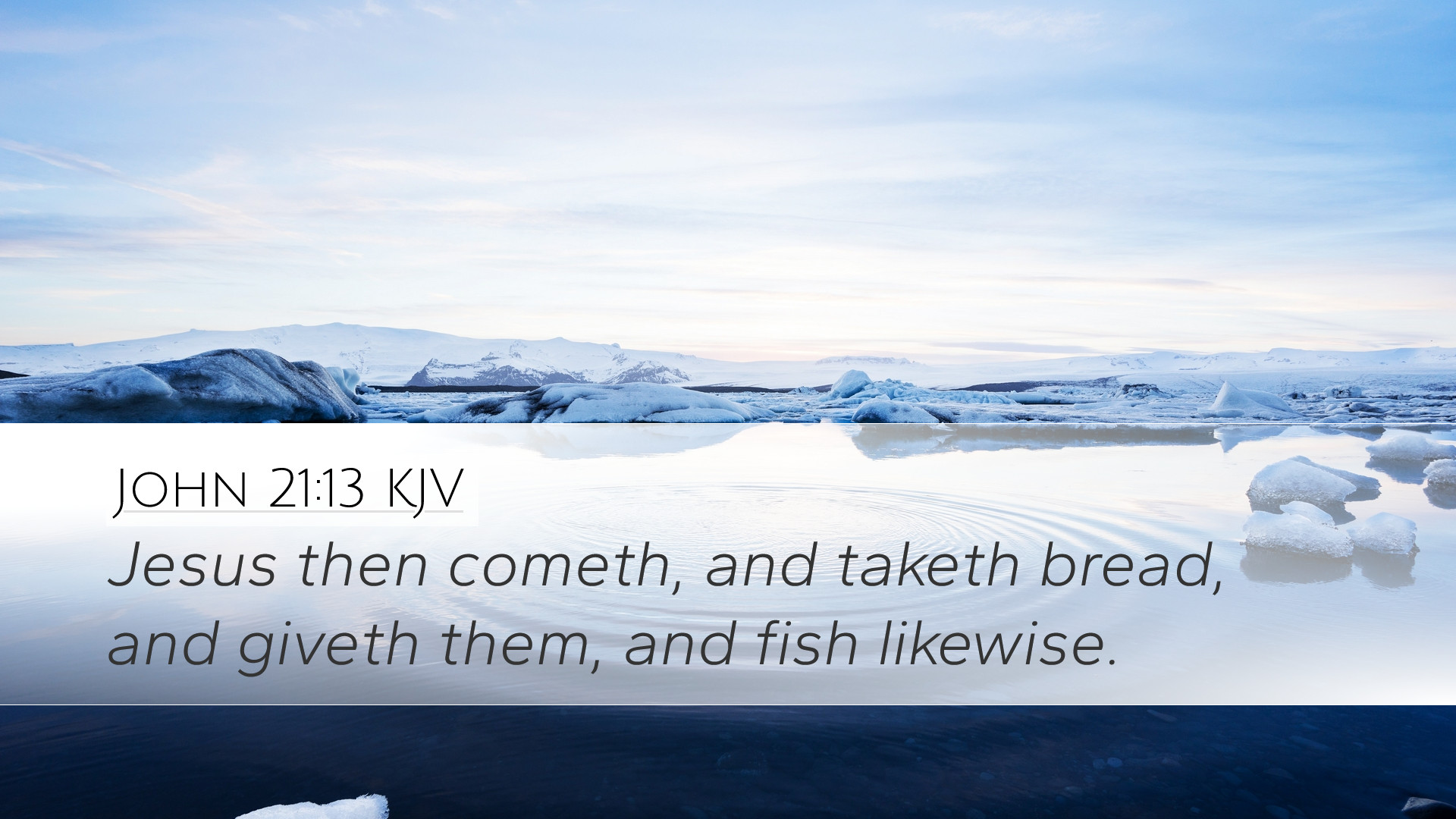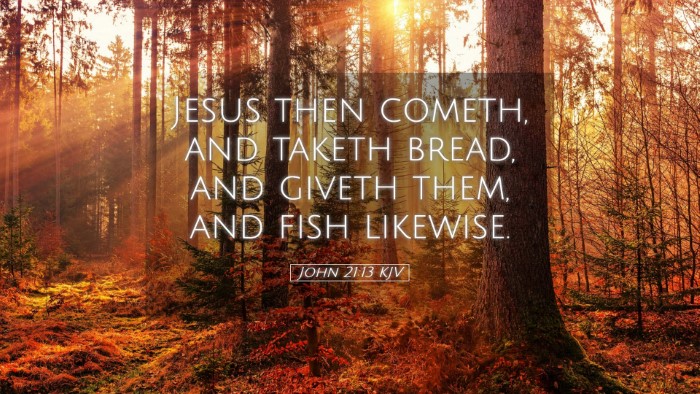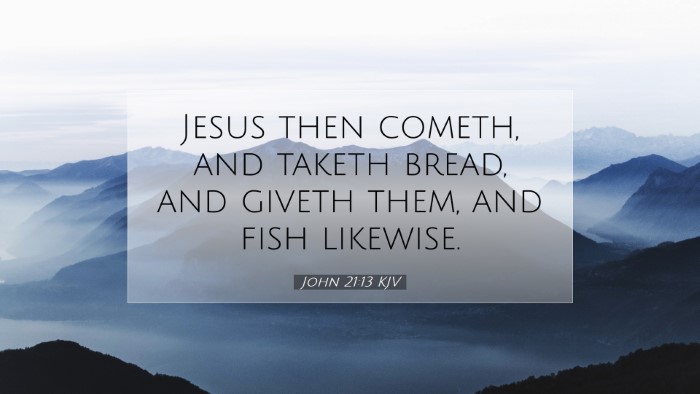Old Testament
Genesis Exodus Leviticus Numbers Deuteronomy Joshua Judges Ruth 1 Samuel 2 Samuel 1 Kings 2 Kings 1 Chronicles 2 Chronicles Ezra Nehemiah Esther Job Psalms Proverbs Ecclesiastes Song of Solomon Isaiah Jeremiah Lamentations Ezekiel Daniel Hosea Joel Amos Obadiah Jonah Micah Nahum Habakkuk Zephaniah Haggai Zechariah MalachiJohn 21:13
John 21:13 KJV
Jesus then cometh, and taketh bread, and giveth them, and fish likewise.
John 21:13 Bible Commentary
Commentary on John 21:13
John 21:13 states, "Jesus then came and took bread, and gave it to them, and fish likewise." This verse encapsulates the profound interaction between Christ and His disciples following His resurrection, emphasizing themes of fellowship, provision, and revelation.
Introduction
The final chapter of the Gospel of John provides rich theological insights and practical applications. In this particular verse, Jesus nourishes His disciples both physically and spiritually, establishing a vital connection between His provision and His role as the Good Shepherd. The details surrounding this meal reveal significant implications for understanding discipleship, community, and Christ's ongoing presence among believers.
The Context of John 21
To fully appreciate John 21:13, it is essential to consider the context of the chapter. Following His resurrection, Jesus appears to His disciples at the Sea of Tiberias. The disciples, having returned to their customary task of fishing, encounter Jesus after a fruitless night. His command to cast their net once more results in a miraculous catch, leading to a moment of recognition among the disciples. The meal that follows serves as a poignant reminder of Christ's sustaining presence.
Insights from Commentaries
- Matthew Henry: Henry highlights the significance of Jesus providing bread and fish, noting that it symbolizes both physical sustenance and spiritual nourishment. The act of sharing food emphasizes the idea of communion and fellowship, which are central to the Christian faith. Henry observes that this meal serves as a practical demonstration of Jesus' care for His followers, reinforcing their identity as His disciples.
- Albert Barnes: Barnes points out the deliberate action of Jesus in taking the bread and fish to give to His disciples. This reflects Jesus as the provider who gives what is necessary for both the body and the soul. The gesture is rich with meaning; it not only manifests Jesus' role as sustainer but also encourages the disciples by restoring their sense of purpose after the trauma of His crucifixion. Barnes also suggests that such moments of divine provision are meant to reinforce the disciples’ faith and understanding of their mission ahead.
- Adam Clarke: Clarke further elaborates on the importance of the meal, drawing parallels to the Last Supper. He emphasizes that this post-resurrection meal symbolizes the ongoing relationship believers have with Christ, as He continues to invite His followers to partake in His sustenance. Clarke also observes that the sharing of food reflects a deep bond of intimacy and trust between Jesus and His disciples, a theme that is critical for understanding the nature of Christian fellowship.
Theological Implications
John 21:13 serves as a powerful reminder of several core theological concepts:
- Communion with Christ: The act of sharing a meal with Jesus signifies ongoing communion. This is not merely a cultural practice of hospitality; it represents the way in which believers are invited into relationship with Christ, reinforcing the concept of Him being the Bread of Life (John 6:35).
- Provision for Ministry: The feeding of the disciples highlights Christ's role as the provider for their future ministry. Just as He provided for their physical needs, He also equips them spiritually for the work of the church.
- The Nature of Discipleship: Jesus’ interaction in this verse underlines the communal aspect of discipleship. Following Christ is not a solitary endeavor; rather, it involves community and shared experiences among believers.
Applications for Ministry
For pastors, students, theologians, and Bible scholars, this verse calls us to reflect on the ways Christ continues to provide for His people:
- Encouragement in Empty Times: Just as the disciples experienced discouragement after a night of failed fishing, church leaders must recognize that moments of despair can precede great breakthroughs through Christ’s provision.
- Fostering Community: Emphasizing the importance of shared meals in ministry can cultivate a spirit of fellowship and accountability within congregations. Leaders should encourage gatherings that strengthen communal ties and deepen relationships among believers.
- Recognizing Christ's Presence: This passage serves as a constant reminder of Jesus’ ongoing presence with His followers. It encourages leaders to remain aware of how Christ is actively involved in the lives of their congregants, providing for their needs in various forms.
Conclusion
In summary, John 21:13 is rich with theological meaning and application for the life of the church. The interaction between Jesus and His disciples during breakfast not only illustrates His role as Provider but also establishes patterns for discipleship and community that endure today. As believers partake in the practices of sharing, fellowship, and reliance on Christ, they echo the early church's experience, building towards a vibrant community that reflects the love and care of Christ.


